Stellar performances
Stars take centre stage in pantos
Country estate’s retelling of the Nativity



Stars take centre stage in pantos
Country estate’s retelling of the Nativity


The Salvation Army is a Christian church and registered charity seeking to share the good news of Jesus and nurture committed followers of him. We also serve people without discrimination, care for creation and seek justice and reconciliation. We offer practical support and services in more than 700 centres throughout the UK. Go to salvationarmy.org.uk/find-a-church to find your nearest centre.
The Salvation Army first published a newspaper called the War Cry in London in December 1879, and we have continued to appear every week since then. Our name refers to our battle for people’s hearts and souls as we promote the positive impact of the Christian faith and The Salvation Army’s fight for greater social justice.
Editor: Andrew Stone, Major
Deputy Editor: Philip Halcrow
Assistant Editor: Sarah Olowofoyeku
Staff Writer: Emily Bright
Staff Writer: Claire Brine
Editorial Assistant: Linda McTurk
Graphic Designer: Mark Knight
Graphic Designer: Natalie Adkins
Email: warcry@salvationarmy.org.uk
The Salvation Army United Kingdom and Ireland Territory 1 Champion Park London SE5 8FJ
Tel: 0845 634 0101
Subscriptions: 01933 445445 (option 1, option 1) or email: subscriptions@satcol.org
Founders: William and Catherine Booth
International leaders: General Lyndon Buckingham and Commissioner Bronwyn Buckingham
Territorial leaders: Commissioners Jenine and Paul Main
Editor-in-Chief: Major Julian Watchorn
Published weekly by The Salvation Army
© The Salvation Army United Kingdom and Ireland Territory ISSN 0043-0226
The Salvation Army Trust is a registered charity. The charity number in England, Wales and Northern Ireland is 214779, in Scotland SC009359 and in the Republic of Ireland CHY6399.
In the run-up to Christmas there are two traditional dramatic productions that thousands of people watch every year.
One of those is the pantomime (oh yes, it is). As we report this week, theatregoers of all ages gather together to cheer for the hero, boo the villain and laugh along with the pantomime dame.
The retelling of well-known stories such as Jack and the Beanstalk, Cinderella and Aladdin that incorporate songs, audience participation, spotlights and dancing seem to fit with the fun and festivities of the season.
The other type of Christmas productions being staged at this time of year are Nativity plays. This month performers of all ages will be presenting the story that recalls the birth of Jesus. However, the reality of this story is in stark contrast to a pantomime’s slapstick nature.
‘There’s something so raw and so real about this story,’ Charlotte De Klee, the producer of the Wintershall Nativity play, tells us in an interview this week.
Charlotte explains how her play is performed in the Surrey open air with real animals accompanying the audience as they walk round the sets, following the Bible story.
‘I want the audience to connect – even in the squelchy mud and the weather – with nature and with the very humanness of it all,’ she says, adding: ‘I hope audiences find the peace that passes all understanding and reconnect with the simple things of life and with this baby in the stable.’
While it can be great fun to watch a pantomime or Nativity play, it can be easy to get caught up in the trappings of Christmas – the lights, the food and the gift-giving, if we have the money to do so. But none of those things have the capacity to change our lives.
However, the child whose birth is remembered in Nativity plays can do exactly that. Jesus has changed the lives of millions of people ever since he was born. If we let him, he can change our lives too and bring a peace we have never experienced before.


Printed by CKN Print, Northampton, on sustainably sourced paper


Your local Salvation Army centre



This year’s CBeebies panto is a production of Beauty and the Beast

Feature by Sarah Olowofoyeku
Pantomime season is well under way, with stages across the UK and Ireland welcoming celebrities dressed up as the characters of traditional children’s stories, Peter Pan, Jack and the Beanstalk, Rapunzel and more. Stars such as Katie Price, Julian Clary and Kerry Katona are in this year’s casts.
The CBeebies Panto is one of the most accessible productions on offer, as it is shown in theatres and then on BBC iPlayer. This year its pantomime of Beauty and the Beast, featuring the channel’s favourite presenters, will be available for families everywhere to enjoy.
Although not necessarily Christmasthemed, today pantomimes are considered a staple of many people’s holiday celebrations – a tradition which began in the late 19th century, when the shows began to open on Boxing Day.
At that time, the productions were marked by physical comedy and gestures, as well as mime, puns, wordplay and audience participation – all of which will be familiar to today’s pantomime crowds.
Getting involved is a huge part of the appeal for anyone attending these theatrical experiences. Cheering for the characters they like, booing the ones they don’t, shouting out ‘it’s behind you!’ and pointing to clues to help characters along their quest is a lot of fun for children and parents alike.
Other favourite features of panto
include humans dressed up as animals, magical characters such as a fairies, comedy singalongs, a slapstick scene, the main boy and main girl (the goodies), and the baddie getting their comeuppance.
The plots often involve the goodies trying to achieve something, but having obstacles put in their way by the baddie. But, by the end of the performance, that baddie has been defeated and the goodies are victorious and live happily ever after. That’s the message of pantos: good always wins in the end.

It is a message that many people hope will be true off-stage too. But when we look at the realities of our own lives and the challenges that we face, it can be hard to believe that that could ever be the case. However, one book tells the ultimate tale of good winning in the end.
The Bible is filled with stories of many characters who are trying to achieve a righteous life and be good, but they keep failing. Because sin entered the world thousands of years ago, we – the humans God created – can no longer be good on our own.
Jesus, though, lived a perfect life and took on the punishment for our failures by dying on a cross. Because he was then raised to life, he defeated death – the
CBeebies presenters star in an annual performance
ultimate enemy.
One of the Bible’s most well-known characters, Paul, wrote that after Jesus’ resurrection, these words had come true: ‘Death is destroyed; victory is complete!’ (1 Corinthians 15:54 Good News Bible).
The victory Jesus secured and that we can share in is that, when people die, they won’t be dead for ever. They will live again like Jesus if they believe in him – in an afterlife with no evil, just good.
If we put our trust in Jesus, even though the world may seem a mess right now and we still face personal challenges, we can be assured that God wins in the end. Too good to be true? Oh no, it’s not.
her take on a story that has caught the attention of War
‘History isn’t horrible. It’s human beings that are horrible,’ said Terry Deary, the man behind the Horrible Histories book series for children. Now he has penned A History of Britain in Ten Enemies for grown-ups.
In a recent interview featured in the Big Issue, Terry discussed some of Britain’s ‘distasteful episodes’ of the past and reflected on its entanglements with other countries over the centuries.
‘Pacifists bemoan the horrors of war,’ he said, ‘but it seems people enjoy having someone to hate. They demonise someone who has a different birthplace, religion, ethnicity or culture.’
After explaining that people across the ages have always felt the need to ‘“invent” an enemy’, Terry said that the modern world is no different, with individuals adopting the mindset: ‘That family over there are immigrants. Let’s hate them.’
It can be easy to distance ourselves
He went on to ask: ‘When is someone going to explain that we shouldn’t be looking for our differences? We should be looking for what we have in common.
‘Donald Trump has caps with MAGA on them – Make America Great Again,’ he continued. ‘We should be wearing caps that read WAAH. We. Are. All. Human.’
Without schools teaching such a tolerant philosophy, Terry believes that ‘there will always be enemies’. And I think he’s right.
If we continue to think that there are people living in the world who aren’t like us, it can be easy to distance ourselves from them, to dismiss their pain or even grow to hate them.
But when we take a moment to consider all the ways in which human beings are the same – all capable of love, all affected by loss – it’s highly possible that our hearts will begin to soften. We can be filled with compassion because we know, deep down, that human being over there could, in fact, be us.
A figure from the history books who gave great advice on how to treat our enemies was Jesus, who said: ‘Love your enemies and pray for those who persecute you’ (Matthew 5:44 New International Version). Perhaps, for us, it seems a big ask. And it is. But when we recognise that a good start to loving our enemies simply means seeing their humanity, perhaps we stand a chance of creating a new history: one in which people aren’t so horrible.
Durham Cathedral is displaying three copies of the Magna Carta next year – which established basic human rights in England and Wales – marking 800 years since its 1225 edition was first published.
BBC News reported that the original Magna Carta, first signed in 1215, ‘has been described as the most famous document in English history and a cornerstone of modern democracy’.
The medieval manuscript enshrined the right to a fair trial, limits to taxation without representation and the idea that no one was above the law, even the king. The Magna Carta would prove a source of inspiration to the writers of the Universal Declaration of Human Rights and the US constitution.
The cathedral is planning to exhibit the only surviving Magna Carta copy from 1216, which was reissued with 42 clauses instead of the original’s 63. It will also display copies from 1225 and 1300 – the latter being the last time the Magna Carta was published under the King’s seal, by Edward I.
Almost 19,000 visitors saw the ancient copies of the Magna Carta when they were last displayed in the cathedral for 11 weeks in 2017.




A church in Bradford which hosts a Christian professional wrestling charity is attracting audiences by putting on regular shows that are ‘interspersed with prayer, worship
The Times.
According to the article, wrestlers from Kingdom Wrestling attend St Peter’s Church in Shipley once a month in order to entertain audiences and share
The charity’s founder, Gareth Thompson – who wrestles under the name ‘Angel’ – explained that since holding the first ‘wrestling church’ three years ago, the charity has baptised more than 30 people, staged dozens of wrestling matches and grown a dedicated fan base.
The article also explained that, as well as running wrestling events, Kingdom Wrestling works with schools and pupil-referral units, runs a training school, a men’s mental health group and women’s self-defence classes.
In an interview last year Gareth told the War Cry: ‘I want people to come away thinking that church isn’t what they expected it to be – that it’s a lot more fun.’
nThe Salvation Army is helping to provide extra emergency support through its centres to save the lives of those experiencing homelessness this winter.
The church and charity is working in partnership with councils across the UK to prevent people living on the streets from dying from the cold. It is providing hot food, clothing and signposting people to other organisations.
Examples include its No 10 day centre in central London which is giving out hats, scarves, gloves, socks and sleeping bags to rough sleepers, and offering them a warm space and a hot meal.
Meanwhile at the Swan Lodge Lifehouse in Sunderland, extra space has been made available for emergency beds, and the Salvation Army church in Basildon has daytime drop-in sessions where people experiencing homelessness can take a shower, do their laundry and enjoy tea, coffee and toast.
The church and charity’s director for homelessness, Nick Redmore, said: ‘We’re really concerned that more people than ever before will be forced to sleep rough this winter.’


TAt a time of year when doorbells across the country will be ringing with arrivals of all sorts of parcels and packages, COLIN WEBSTER invites people to think about one very special delivery
Interview by Sarah Olowofoyeku
he last Christmas orders are just over a week away and, across the country, gifts will be arriving at people’s doors. Deliveries happen all year round, but at this time of year they often contain the most considered, thoughtful or expensive gifts. For many people, Christmas is a time of giving and receiving. Sometimes hours can be spent trying to find just the right gift for somebody. A present that will let them know how much they are loved, and that the giver knows them well enough to get them something they truly want or need.
Colin Webster, one of the ministers at Cornerstone Church in Nottingham, has written Special Delivery, which centres on what he believes to be the most special delivery of all – Jesus. Basing the book around the second chapter of Luke’s Gospel, he unwraps the meaning behind the story told, acted out and celebrated all over the world at Christmas.
The special delivery arrived, Colin explains, accompanied by ‘heavenly postmen’ – angels who appeared to shepherds out in the countryside looking after their sheep. The announcement was about a long-awaited arrival.
‘When we were children, it often felt like Christmas was a long time coming,’ Colin tells me. ‘Now we stand in queues to buy presents and wait in traffic jams
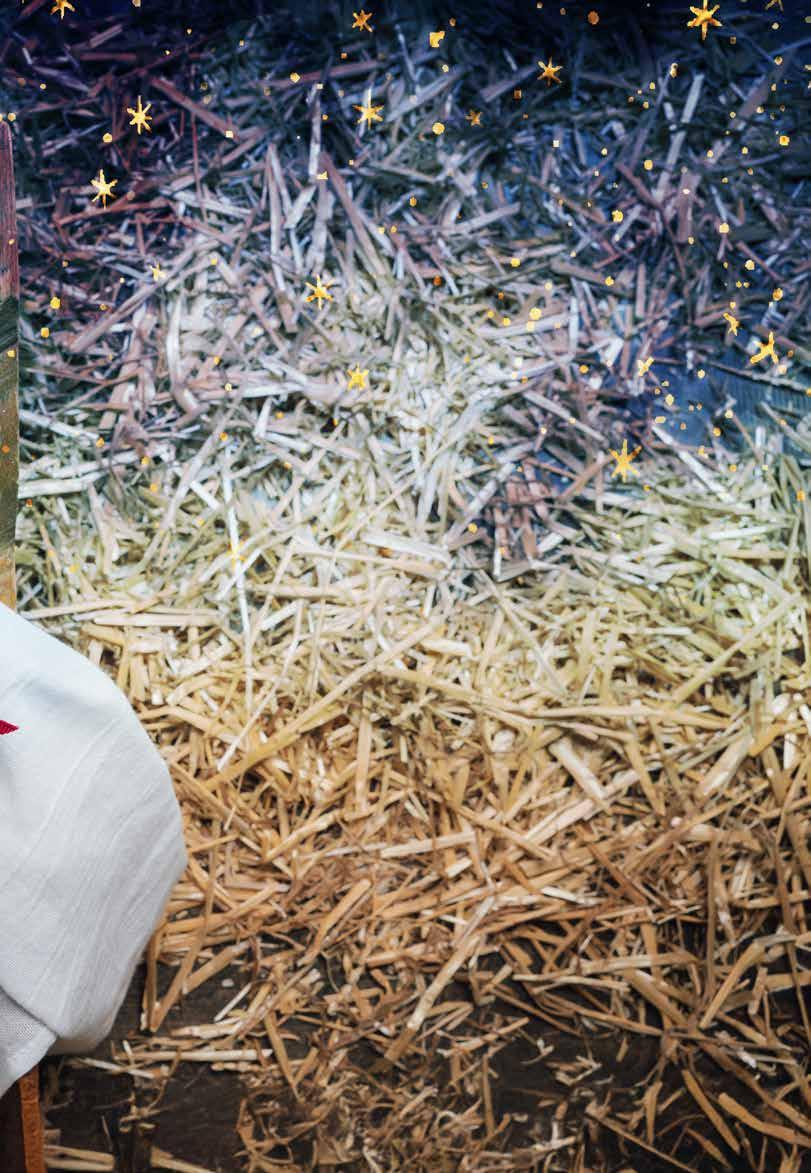
to come home. It ties in with how the Jewish people felt years ago. They had been waiting centuries for this promised Messiah, the gift that God was going to give them of a saviour.’
But when that Saviour came, it was in an unexpected way – as a baby born and placed in a manger.
‘We’re
so used to seeing the scene of the manger on Christmas cards and to seeing children act out the Nativity,’ Colin explains. ‘So I don’t think we fully grasp just how humble Christ was when he was laid in a manger. His first intake of air was that of the breath of animals.
‘The images we have today show it looking clean, with no muck, no dirt. But the reality is that it was stinking, it wasn’t a sanitised ward in the hospital, it was messy, it was degrading in many ways. But it shows how low God was willing to stoop in order to identify with us at every
From page 7
level, even what we feel are the lowest levels. Jesus identifies with everything.
‘No loving parent would ever want their child to be born in poor conditions. But it was all that Mary and Joseph could find for Jesus, because no one was prepared to give them room. That’s indicative of many people today, who don’t allow room for God in their lives, or who don’t give him the best place. They relegate him to the stable of their life, tucked away in a corner.’
Colin explains that Jesus came to the world in such a lowly way for our benefit: ‘He who was rich became poor, so that through him we could become rich, not in monetary terms, but actually in terms that money could never buy – eternal life with God, and all the blessings of Heaven.’
He goes on to say that this gift of eternity is something that people can’t earn on their own and he believes it’s something that no one actually deserves.
We have never once lost our true value to God
‘God says all of us have fallen short of his glory, none of us are good enough. That’s a hard thing, because nobody likes to think they’ve failed in life, but the truth is, we have. Then there are also people who think little of themselves. But however badly we think we’ve failed, we have never once lost our true value to God.
‘We might think we are just rubbish, that we’ve screwed up and messed up so much that God surely would not want someone like us. But God says: “I came even for the likes of you, no matter what you’ve done, you’re not beyond redemption’s reach, you’re not beyond the love of God, or my Son stepping into your life.”’
Christians believe that the gift of
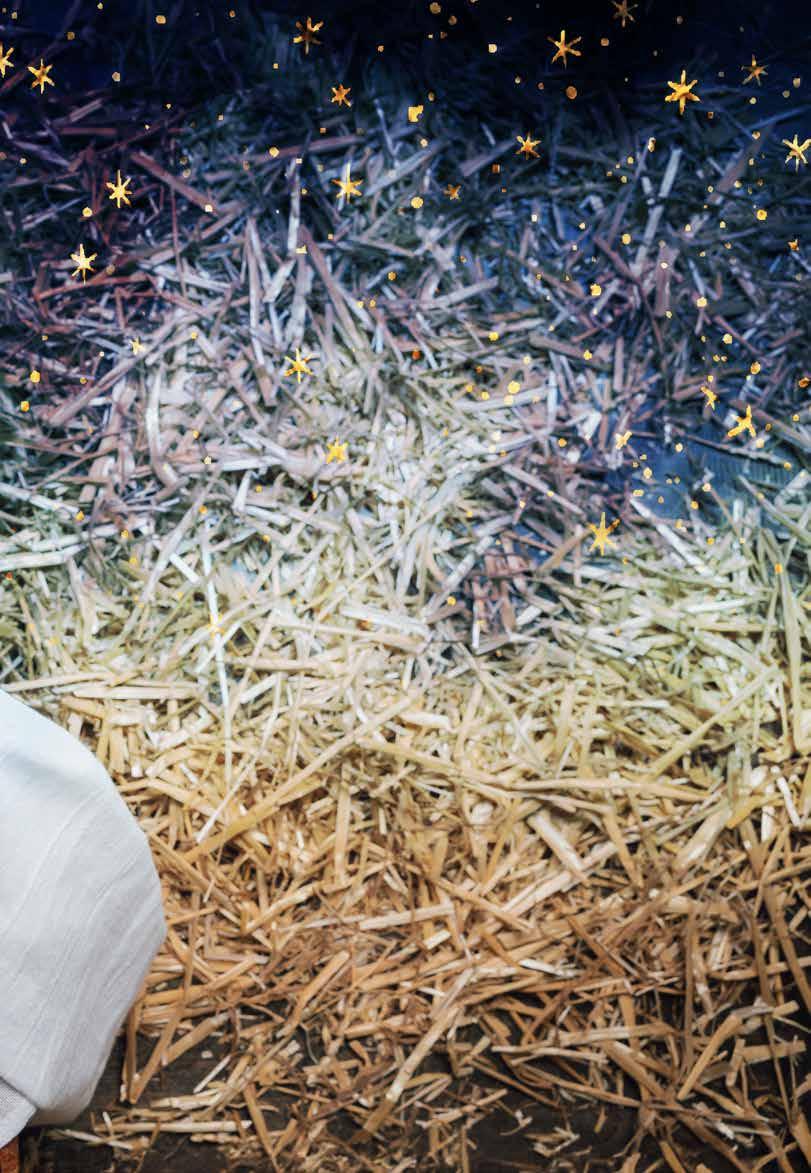
redemption comes at a cost – but that the price is not for people to pay.
‘We could never imagine the sacrifice and heartache to God in giving us his Son to die in our place. It was immensely costly,’ says Colin who explains that, while it was costly to God, he offers it to everyone as a ‘genuinely free gift’.
‘The Bible says that the wages of sin is death, but the gift of God is eternal life. When my wife gives me a gift at Christmas, I don’t put my hand in my pocket and say that must have cost you a few bob, let me see what loose change I’ve got. That’s insulting,’ he says. ‘The gift was costly. It can only be received or rejected. We can’t pay for it and we can’t bargain for it.
‘Some people may feel that in order to have God in their life, they have to clean up their life first and make it presentable. But God says to come to him as we are, and then he will make us as we have never been. Jesus said he had come to seek and save those who are lost. He didn’t come for the healthy, but those that realise they’re sick – sin-sick, they’ve failed in life, they’re not good enough. He came to make them fit for Heaven, and journey with them through life, shaping them into the great men or women he intended them to be.’
Colin uses marriage as an analogy to describe the relationship people can have with God, and explains that, although we don’t have to change before we can accept God into our lives, there will be inevitable changes once we make that decision.
‘You cannot carry on living as a single man or woman if you’re married,’ he says. ‘And on the cross, Jesus was saying to a broken world, “I do take you, all that I have I give to you, with my body I offer it to you.” God waits for us to say that back to him, ‘Lord, I want to give you all that I am. I know it’s a mess and not all that it ought to be, but I surrender myself
to you.”
‘When we enter into that incredible relationship with God, he begins to change us from the inside out. I haven’t got the power within me to truly change, but when I became a Christian, I found the journey of change happened more quickly, because I needed his power to change me, my attitudes, my morals and my heart.’
Just as with some special deliveries that arrive at our front doors, this gift is one that can’t be left by the bins – the courier says it must be signed for.
‘God doesn’t want us to just know about the gift, and to never unpack it or use it,’ Colin says. ‘The only way it “cashes out” in our lives is if we receive Jesus personally. This relationship with him mustn’t be packed away ready to bring out at Christmastime as a nice thought to warm our hearts – Jesus wants to change our hearts and walk through this life with us every day.’
l Special Delivery is published by 10ofthose
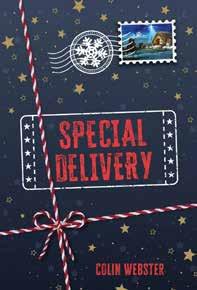
CHARLOTTE DE KLEE, the producer of Wintershall’s Nativity play, explains what has inspired the cast and crew to retell the story – and its timeless truths – for decades
Interview by Emily Bright

Wintershall has performed Nativity plays since 1989
‘We’ve had times when the sheep have escaped into the audience, or when the horses have been doing things they shouldn’t be doing,’ recalls Charlotte De Klee, the producer of the Wintershall Nativity play which is performed in the open air of Surrey. ‘Or baby Jesus hasn’t stopped crying since he arrived on set. I’m thinking: “Oh my gosh, this is a nightmare.”’
Such occupational hazards, part and parcel of live performances, are thankfully
Turn to page 10 f
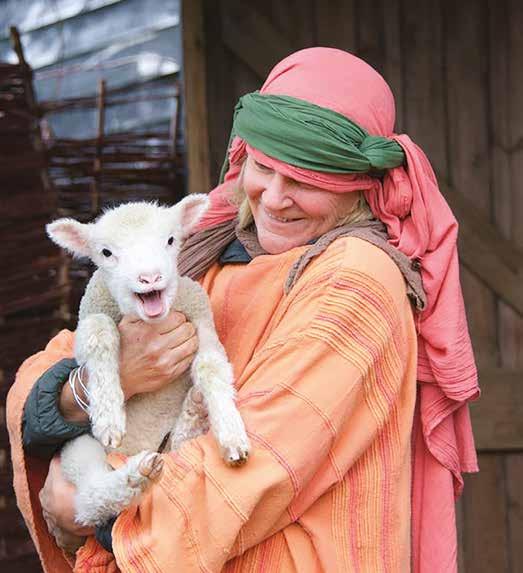
From page 9
a comic footnote rather than a cause for concern. After decades of retelling the story of the birth of Jesus, Charlotte is equipped to deal with any challenge.
The Nativity Journey has been performed at the Wintershall Estate in Surrey since 1989, receiving rave reviews from audiences and members of the press alike. More than 4,000 visitors attend performances each year.
Perhaps the strength of the play lies in its immersive delivery. Audiences follow Mary and Joseph on their journey across the fields as they prepare for the arrival of baby Jesus, the Saviour of the world.
‘Whether it’s raining or snowing, we follow a young couple and their donkey on their journey,’ says Charlotte. ‘The story is as present today as it ever was – the refugee couple looking for somewhere to live. We stand with them outside the inn, about to be turned away.
‘Then we go round the edge of the barn, and we stand in the fields with the shepherds, who are tending their fires and are with the sheep. The angel appears up high in a tree and we follow the star, and the star takes us into the barn.
‘We sit on wooden benches, and there’s a beautiful choir. There’s Mary and Joseph with a new baby – who might or might not
be crying. We’re there with them in the barn. We’re part of their journey. We’ve experienced it.’
Charlotte adds that the Nativity story can help us reframe our approach to the festive season.
‘Every year we’re all too busy, we’re all too frantic,’ she says. ‘We might not see the star or hear the angel because we’re in such a fluster to get towards Christmas, but every year, Jesus is born again for us.
‘I hope audiences who see our Nativity find the peace that passes all understanding and reconnect with the simple things of life and with this baby in the stable.
‘We’re located in such a beautiful part of Surrey. I want audiences to connect with nature – even in the squelchy mud and the weather – and with the very humanness of it all. There’s something so raw and so real about this story.’
It’s a story that Charlotte has played a central role in retelling over the years, because the play began as a family affair. Her parents, Peter and Ann Hutley, aimed to buy the land and barn behind their 13th century home on the estate, planning to use it for what they believed to be God’s purposes. A matter of weeks after securing the sale, the Hutley family – with
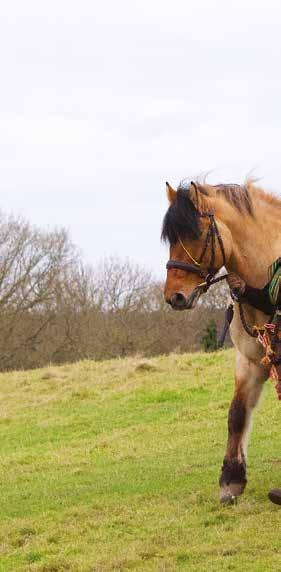
particular impetus from Ann – put on their first Nativity production in the barn.
The experience inspired Peter to pursue playwriting. In 1993, the family staged his first Passion play – telling the story of Jesus’ death and resurrection. And in 1999, they put on a five-hour performance called Life of Christ. Both are still going to this day, with the Passion play being performed in London’s Trafalgar Square each year.
Volunteer actors from all walks of life

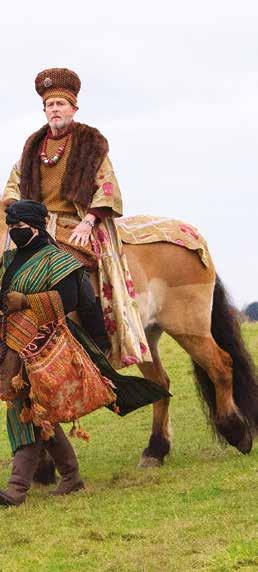
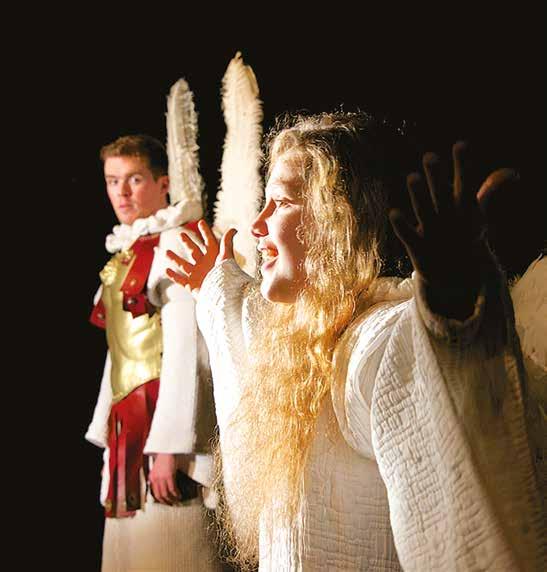
and generations have taken part in the Wintershall plays ever since, including members of Charlotte’s family. This year’s Nativity Journey is no exception.
‘I’ve got nephews, great nephews and nieces, our kids and our children’s kids in it,’ says Charlotte. ‘And there are other members of the cast who have been in it for ever. There are people who played baby Jesus and are now acting as Mary. I’m so thrilled that so many young people, 16 to 30-year-olds, want to be in it too. It’s wonderful.
‘I love the diversity of ages, from baby Jesus to Simeon in the temple who’s 90. Some of the cast are out of work, some of them might be bankers. We are a completely diverse collection of people. It’s really a marvellous thing to be part of this community.’
Charlotte sees working with a dedicated volunteer base as one of the most enjoyable elements of her role as producer.
‘It’s a great privilege to be part of a team with all these amazing people who give up their time,’ she says. ‘They come because they believe that we must remember Christmas, and it’s not about Santa, commercialism, running into debt and flogging yourself. It’s about
remembering Christmas in its true sense of the word.’
For Charlotte, the Nativity is much more than a story on a stage. It signposts people to the Saviour of the world, Jesus.
‘Jesus changed my life,’ she explains. ‘It was pretty good before, so it wasn’t as if I needed a crutch or anything like that. But my faith has become the reason for my life. I believe that there’s more to the world than what we see. I believe in the power of prayer. I believe in the power of God, through his Son, Jesus, and in the Holy Spirit.
‘I don’t know how people manage to get through life without that extra help. I feel so fortunate that I have had Jesus with me through the more difficult times of my life.’
TheWintershall team are passionate about sharing the powerful story of Jesus. Not even a global pandemic stopped them. During Covid lockdowns schools were unable to travel to Wintershall for performances of the plays. So the team decided to take their performances to the schools, through
what Charlotte calls ‘a travelling crib’.
‘We’d pack up the sheep and the donkeys and we’d set up in playgrounds and car parks,’ she remembers. ‘It spread from school to school.’
It’s become a continuing tradition. This year’s cast and crew are embarking on another Christmas tour.
‘We’ll see 5,000 children in December,’ says Charlotte. ‘Last month we were in Lambeth Palace gardens, and saw 1,000 children. We talk about the journey to Christmas and Jesus being born.
‘We’ll be all over southeast England, performing in various schools. And then schools come on retreats and even inset days to see us.’
Thirty-five years on from Wintershall’s first Nativity play, Charlotte believes that communicating the story of Jesus to schools – and the general public – remains as essential as ever.
‘There are so many mental health problems out there,’ she says. ‘People are saying: “Who am I? What am I? What’s it all for?” And our job is to say: “You’re deeply loved, you’re very important and God has a plan for your life.”’
l The Nativity Journey runs from 11-16 December
The War Cry invites readers to send in requests for prayer, including the first names of individuals and details of their circumstances, for publication. Send your Prayerlink requests to warcry@salvationarmy.org.uk or to War Cry, 1 Champion Park, London SE5 8FJ. Mark your correspondence ‘Confidential’.
jBecoming a Christian
There is no set formula to becoming a Christian, but many people have found saying this prayer to be a helpful first step to a relationship with God
by John Cheek
Lord Jesus Christ,
I am truly sorry for the things I have done wrong in my life. Please forgive me. I now turn from everything that I know is wrong.
Thank you that you died on the cross for me so that I could be forgiven and set free.
Thank you that you offer me forgiveness and the gift of your Holy Spirit. Please come into my life by your Holy Spirit to be with me for ever.
Thank you, Lord Jesus. Amen



Christmas is sometimes described as a season of peace and goodwill. However, at the moment, events in other parts of the world suggest that there isn’t much peace or goodwill to be had. So where did this concept come from?
At the very first Christmas, when Jesus was born, a great company of angels appeared to the shepherds nearby, praising God and saying, ‘Glory to God in the highest Heaven, and on Earth peace to those on whom his favour rests’ (Luke 2:14 New International Version).
It was 110 years ago, on Christmas Day 1914, that German and Allied soldiers on European soil gave peace a chance. Known as the Christmas truce, photographic and anecdotal evidence from all sides has confirmed how goodwill was on display between First World War enemies. Up until then, German and Allied troops had been shouting verbal abuse, from their respective trenches; sometimes just 30 yards apart. This was during the opening months of the war, that both sides had expected to be over by Christmas.
However, by Christmas Eve, it was apparent that there was no end in sight. That evening German troops sang Christmas carols along different stages of the front line. Allied troops began singing carols too, in English. Shouted greetings began to be exchanged. A German voice shouted in English: ‘Tomorrow, you no shoot, we no shoot’.

The next day, British, French and German troops tentatively emerged from their trenches and met in No Man’s Land. Handshakes were exchanged, to be followed by gifts of cigarettes and chocolate shared among the respective ‘enemies’. Some soldiers took photographs of the gestures of goodwill being shown by rival troops. It afforded an opportunity for dead bodies to be retrieved from No Man’s Land. At one point a football was produced from the German side and a ‘friendly’ kick-about commenced!
Nearly 2,000 years before the First World War, Jesus taught: ‘Blessed are the peacemakers’ (Matthew 5:9), and he encouraged his followers to ‘love your enemies and pray for those who persecute you’ (5:44). At the time, it was regarded as radical teaching and it still is today. But 110 years ago, many fighting men proved that it was possible. Perhaps this Christmas we can too.

To receive basic reading about Christianity and information about The Salvation Army, complete this coupon and send it to
Cry


What were the first names of the Gibb brothers in the Bee Gees?
Which British comedian recently published her bestselling autobiography, I Haven’t Been Entirely Honest with You?
Which rock band sang the 1980s hit song ‘Livin’ on a Prayer’?
Who played the title role in the 1978 film Superman?
Scafell Pike is the highest mountain in which country of the UK?
What does the French phrase

Feature by Emily Bright
Festive
fashion statements are in this season. Christmas Jumper Day, which takes place on Thursday (12 December), enables people to express themselves through colourful knitwear – whether they choose to embrace their inner style icon or their silly side. Some people even find it a-mews-ing to dress up their furry friends in festive jumpers.’
Colourful and patterned winter jumpers date back to workwear in 19th-century Scandinavia. But the Christmas versions were popularised in the mid-20th century by Hollywood stars such as Clark Gable and Ingrid Bergman.
By the 1980s, UK TV presenters such as Noel Edmonds took up the trend. And, in 2001, Colin Firth dazzled the nation with his Christmas reindeer rollneck while playing Mark Darcy in the rom-com Bridget Jones’s Diary.
In recent years Andy Murray, Olly Murs, Jennifer Saunders, Joanna Lumley and Lorraine Kelly joined a growing number of UK celebrities in proudly wearing Christmas jumpers.
As the popularity of the festive knitwear has increased, so has the range of styles. Some jumpers highlight Christmas themes – from dinners to decorations, and from snowmen to Santa. Meanwhile, others favour more traditional knitting patterns. Still others are branded with film references and puns. But whatever designs people choose, the jumpers have one thing in common: they’re a joyful celebration of Christmas.
While the fun of the festive season is great, it’s also worth reminding ourselves that we can experience joy far beyond December, regardless of our circumstances.
Christians believe that lasting joy can be found in a relationship with God, who delights in us. One Bible writer, who wanted to express his good cheer, sang to God: ‘Your presence fills me with joy and brings me pleasure for ever’ (Psalm 16:11 Good News Translation).
Joy stems from knowing that we are fully accepted, loved and secure in God, who is there for us every moment of our lives – celebrating life’s highs alongside us and comforting us in the lows.
Sometimes, it’s not a wonderful life that we’re living. But God provides for our every need and aids us in our times of crisis. When we’re struggling, we can be honest with God about our need for help. And, while he may not solve our problems overnight, he’ll always carry us through them, wrapping us in his love and comfort.

ACROSS
1. Submerge (4)
3. Thick mist (3)
5. Tome (4)
7. Commonly (9)
9. Story (4)
10. Vault (4)
11. Adjust (5)
14. Destined (5)
15. Proportion (5)
17. Impel (5)
18. Squander (5)
19. Warning signal (5)
20. Attire (5)
23. Intellect (4)
25. Stated (4)
27. Pressing necessity (9)
28. Encircle (4)
29. Boy (3)
30. Repair (4)
DOWN
1. Remain (4)
2. Eager (4)
3. Meadow (5)
4. Clutch (5)
5. Invoice (4)

6. Retain (4)
7. Weird (9


8. Day before (9)
11. Appended (5)
12. Nimble (5)
13. Long lock of hair (5)
14. Not many (3) 16. Possess (3)

21. Pastoral (5)
22. Pace (5)
23. Close (4)
24. Self-satisfied (4)
25. Dross (4)
26. Expired (4)
Look up, down, forwards, backwards and diagonally on the grid to find these children’s books


INGREDIENTS
300g brown rice
1tbsp vegetable oil
1 onion, diced
1 green pepper, sliced
1 garlic clove, finely diced
200g mushrooms, sliced
400ml reducedsalt vegetable stock
300g cooked turkey, shredded
160g peas, frozen
40g Parmesan cheese, grated
Freshly ground black pepper
Small handful fresh parsley, chopped

Heat a large pan of water and bring to the boil. Add the rice and return to the boil, then reduce the heat until the water simmers. Cover and partly cook the rice for 15 minutes, occasionally stirring. Remove the pan from the heat, drain the rice and set aside.
INGREDIENTS
2tsp olive oil
1 green pepper, diced
1 large onion, diced
240g pearl barley, rinsed and drained
1tsp dried sage
Freshly ground black pepper
550ml reduced-salt vegetable stock
1 butternut squash, peeled, deseeded and cubed
450g cooked turkey breast, cubed





Heat the oil in a frying pan on a medium-high heat and cook the onion and pepper for 2-3 minutes, until softened. Add the garlic, mushrooms and partly-cooked rice and cook for a further minute.
Pour in half of the stock and stir well. Cook over a medium heat for 20-30 minutes, stirring often and gradually adding the remaining stock until the rice has absorbed all the liquid. Cook until the rice is tender, adding hot water if needed.
Add the turkey, peas and Parmesan and cook for 3 minutes, until warmed through. Season with pepper and garnish with parsley before serving.
Heat the oil in a non-stick pan and cook the green pepper and onion for 2 minutes. Add the pearl barley, sage and black pepper and stir well.
Pour in the stock and bring to the boil. Reduce the heat, cover and simmer for 40 minutes. Add the butternut squash to the pan, continue to simmer for 10 minutes.
Add the turkey and simmer for another 5 minutes, until the squash is tender. Add water if required. Serve immediately.

